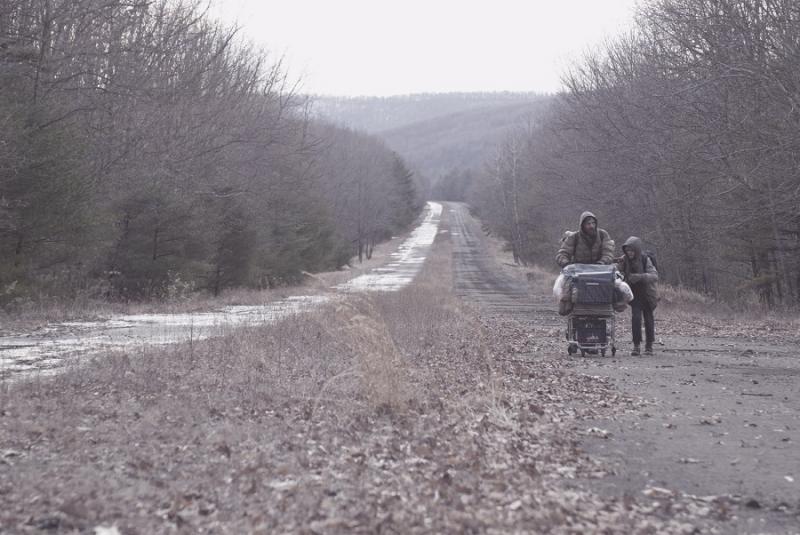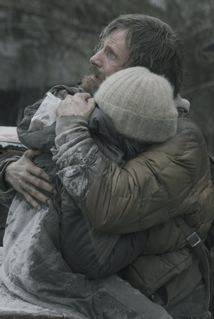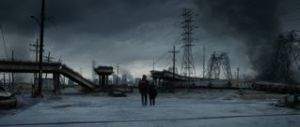The Road | reviews, news & interviews
The Road
The Road
Cormac McCarthy's apocalyptic fable gets respectful treatment from John Hillcoat

Hey-ho. Just when you thought it was safe to go back into the cinema, it's the end of the world again. Where mankind would once have contemplated the apocalypse and its aftermath by way of triptychs and frescos, now it's repeatedly faced with its own extinction in widescreen, with Dolby Digital sound. And if you thought the collapsing CGI cities of 2012 were frivolous, never fear.
McCarthy's literary parable became a bestseller, thanks to Oprah Winfrey interviewing the author on her TV show. It's a page-turner, reads like an artier Stephen King (no commas or quotation marks) but was always going to be a hard sell as a movie since it's so unremittingly grim. McCarthy's world ends with a bang and a whimper; civilisation as we know it is wiped out in some sort of cataclysm, leaving debilitating cold and the sun obscured by ash. You can forget that bucolic post-apocalyptic fantasy of living off the land, because plants and animals appear to be extinct; many of the survivors have turned to cannibalism. All in all, it makes I Am Legend, Knowing, 9, Zombieland, Carriers and The Book of Eli (which opens in the UK on 15 January) look like Disneyworld.
 Through this desolate landcape (CGI-assisted locations in Pennsylvania, Oregon and post-Katrina New Orleans) toil an unnamed man and his young son, played by Viggo Mortensen and Kodi Smit-McPhee. They're heading south. The man is suspicious of everyone they meet, the son more optimistic and forgiving. They scavenge, hide from scary people and stumble across almost unimaginable horrors. It's clear the only thing keeping the man alive is having to look after the boy; his wife, who was pregnant with the kid at the time of the initial catastrophe, has already killed herself.
Through this desolate landcape (CGI-assisted locations in Pennsylvania, Oregon and post-Katrina New Orleans) toil an unnamed man and his young son, played by Viggo Mortensen and Kodi Smit-McPhee. They're heading south. The man is suspicious of everyone they meet, the son more optimistic and forgiving. They scavenge, hide from scary people and stumble across almost unimaginable horrors. It's clear the only thing keeping the man alive is having to look after the boy; his wife, who was pregnant with the kid at the time of the initial catastrophe, has already killed herself.
On the page, while the boy's age is never specified, you get the impression he's seven or eight (in other words, around the same age as the author's son, to whom the novel is dedicated). Smit-McPhee, however, was on the cusp of his teens at the time of filming, and seems too mature for the role. If he's as old as he looks, it must now be more than a decade since the cataclysm, which makes you wonder what they've been doing all that time. Playing Ludo? Surely a real pubescent boy would have long since stopped being as placid and dependent as this one; I know we can't be one hundred per cent certain that an apocalypse wouldn't turn children into obedient little angels, but the father-son relationship here - which should provide the film with its heart and soul - just doesn't ring true.
The other big change from the source material is the pumping up of the wife's role in flashbacks, presumably because she's played by Charlize Theron, though Robert Duvall and Guy Pearce both have fleeting cameos and there's no similar attempt to pad those out. Otherwise, Joe Penhall's screenplay remains a little too faithful to its source; like the Harry Potter movies, it's more of an illustrated version of the book than a living, breathing film in its own right.
 Of course, the film-makers deserve kudos for being remorseless and uncompromising, though this will automatically be equated with excellence by the if-it's-grim-it-must-be-good crowd who wet themselves over Mystic River or the ending of The Mist. Viggo immerses himself in his role so thoroughly, and looks so scrawny and ill-kempt, that even a late-breaking skinny-dipping scene isn't likely to cheer you up, nor is the keening soundtrack by Nick Cave and Warren Ellis. The only moment that got me smirking is when the son wakes up and says, "I had a bad dream." Oh boy, I thought as my imagination went into overdrive, that dream must have been really bad.
Of course, the film-makers deserve kudos for being remorseless and uncompromising, though this will automatically be equated with excellence by the if-it's-grim-it-must-be-good crowd who wet themselves over Mystic River or the ending of The Mist. Viggo immerses himself in his role so thoroughly, and looks so scrawny and ill-kempt, that even a late-breaking skinny-dipping scene isn't likely to cheer you up, nor is the keening soundtrack by Nick Cave and Warren Ellis. The only moment that got me smirking is when the son wakes up and says, "I had a bad dream." Oh boy, I thought as my imagination went into overdrive, that dream must have been really bad.
Hillcoat whipped up a fabulous (and equally grim) antipodean western in The Proposition, and I would like to have seen him cut loose a bit more here, given it some film-making welly instead of plodding respectfully along the predestined route. I'm not asking for the end of the world to be a thrill-ride, but maybe it could have been less of a meretricious trudge.
Add comment
The future of Arts Journalism
You can stop theartsdesk.com closing!
We urgently need financing to survive. Our fundraising drive has thus far raised £49,000 but we need to reach £100,000 or we will be forced to close. Please contribute here: https://gofund.me/c3f6033d
And if you can forward this information to anyone who might assist, we’d be grateful.

Subscribe to theartsdesk.com
Thank you for continuing to read our work on theartsdesk.com. For unlimited access to every article in its entirety, including our archive of more than 15,000 pieces, we're asking for £5 per month or £40 per year. We feel it's a very good deal, and hope you do too.
To take a subscription now simply click here.
And if you're looking for that extra gift for a friend or family member, why not treat them to a theartsdesk.com gift subscription?
more Film
 London Film Festival - from paranoia in Brazil and Iran, to light relief in New York and Tuscany
'Jay Kelly' disappoints, 'It Was Just an Accident' doesn't
London Film Festival - from paranoia in Brazil and Iran, to light relief in New York and Tuscany
'Jay Kelly' disappoints, 'It Was Just an Accident' doesn't
 Iron Ladies review - working-class heroines of the Miners' Strike
Documentary salutes the staunch women who fought Thatcher's pit closures
Iron Ladies review - working-class heroines of the Miners' Strike
Documentary salutes the staunch women who fought Thatcher's pit closures
 Blu-ray: The Man in the White Suit
Ealing Studios' prescient black comedy, as sharp as ever
Blu-ray: The Man in the White Suit
Ealing Studios' prescient black comedy, as sharp as ever
 The Woman in Cabin 10 review - Scandi noir meets Agatha Christie on a superyacht
Reason goes overboard on a seagoing mystery thriller
The Woman in Cabin 10 review - Scandi noir meets Agatha Christie on a superyacht
Reason goes overboard on a seagoing mystery thriller
 London Film Festival 2025 - crime, punishment, pop stars and shrinks
Daniel Craig investigates, Jodie Foster speaks French and Colin Farrell has a gambling habit
London Film Festival 2025 - crime, punishment, pop stars and shrinks
Daniel Craig investigates, Jodie Foster speaks French and Colin Farrell has a gambling habit
 I Swear review - taking stock of Tourette's
A sharp and moving tale of cuss-words and tics
I Swear review - taking stock of Tourette's
A sharp and moving tale of cuss-words and tics
 A House of Dynamite review - the final countdown
Kathryn Bigelow's cautionary tale sets the nuclear clock ticking again
A House of Dynamite review - the final countdown
Kathryn Bigelow's cautionary tale sets the nuclear clock ticking again
 theartsdesk Q&A: Idris Elba on playing a US President faced with a missile crisis in 'A House of Dynamite'
The star talks about Presidential decision-making when millions of lives are imperilled
theartsdesk Q&A: Idris Elba on playing a US President faced with a missile crisis in 'A House of Dynamite'
The star talks about Presidential decision-making when millions of lives are imperilled
 Urchin review - superb homeless drama
Frank Dillane gives a star-making turn in Harris Dickinson’s impressive directorial debut
Urchin review - superb homeless drama
Frank Dillane gives a star-making turn in Harris Dickinson’s impressive directorial debut
 Mr Blake at Your Service review - John Malkovich in unlikely role as an English butler
Weird comedy directed by novelist Gilles Legardinier
Mr Blake at Your Service review - John Malkovich in unlikely role as an English butler
Weird comedy directed by novelist Gilles Legardinier
 Don't Let's Go to the Dogs Tonight review - vivid adaptation of a memoir about a Rhodesian childhood
Embeth Davidtz delivers an impressive directing debut and an exceptional child star
Don't Let's Go to the Dogs Tonight review - vivid adaptation of a memoir about a Rhodesian childhood
Embeth Davidtz delivers an impressive directing debut and an exceptional child star

Comments
...
...